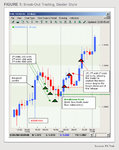TraderPattern said:Continue to preach. I find you funny.
I bet you are not even trading real money with the crap you are spouting!
Words are cheap, I can prove those facts based on SP500 daily charts,
I trade , I don't teach,
I only trade futures, not stocks, not options either
So if you are into swing trading the SP500 or Nasdaq
I'd like to know what's the best you can do with or without
adding to 'losing' positions etc,
my best has been 40% on a small account size in 40 calendar days
my monthly consistent average on a big account (big enough to live on)
is 5% a month
so one mans crap is another mans trading style,
I guess is the difference of opinion that makes a stock exchange work too.
what annoys me is hearing about rigid rules that one should never break
in trading...

